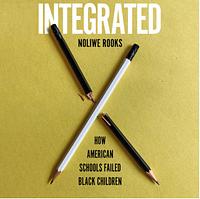Take a photo of a barcode or cover
challenging
dark
emotional
informative
reflective
sad
medium-paced
challenging
informative
reflective
medium-paced
In Integrated, professor Noliwe Rooks weaves history and personal narrative to demonstrate the failures of integration in the American education system. From white flight to the school-to-prison pipeline, Rooks examines how the uneven and inequitable implementation of integration failed at its stated purpose to create a more equal society across racial boundaries. This is a topic I knew about abstractly---specifically, I knew that the burden of integration was placed primarily on Black students and families, and that integration resulted in many Black teachers losing their jobs and therefore Black students losing sources of support---but Rooks's account provided many more examples.
Rooks follows multiple generations of her own family, including the experiences of family members who were teachers, her own experiences in the 1970s, and her son's more recent experiences with k-12 and the college application process. By using her family as case studies, she illustrates the various human impacts of desegregation on Black individuals throughout the years.
Some of the most interesting and thought-provoking parts of Integrated involved Rooks's rebuttal of the myth that class, not race, explains all educational discrepancies (this is often used by the right, and even many not on the right, to justify ending or replacing race-conscious educational policies). She also looks a bit more briefly at differential impacts of integration on several non-white groups, including Asian and Latine students; this is a topic that doesn't fully fit into the book's purview, but that I wanted to learn more about.
There are a few places where the narrative gets a bit dry, but that's fairly typical for educational non-fiction, and I found that the inclusion of so many stories detailing the human impact of desegregation helped keep these drier bits in the minority. This perspective is a critical one, especially in a context where educating racially minoritized students is increasingly under attack from conservatives. How we choose to mitigate, rebuff, or acquiesce to those attacks will have far-reaching consequences, as this book shows.
informative
reflective
medium-paced
Oh what a timely read.
This was such a good, informative read about the desegregation of schools and the aftermath. The absolute hate and racism in this book hurt so much. But unfortunately not surprised. INTEGRATED takes a deep dive into the 1954 case of Brown v Board of Education and the years following.
I read this one via audio, and it’s read by the author - which I alway prefer in my nonfiction.
Highly recommend for your next nonfiction read.
This was such a good, informative read about the desegregation of schools and the aftermath. The absolute hate and racism in this book hurt so much. But unfortunately not surprised. INTEGRATED takes a deep dive into the 1954 case of Brown v Board of Education and the years following.
I read this one via audio, and it’s read by the author - which I alway prefer in my nonfiction.
Highly recommend for your next nonfiction read.
challenging
emotional
hopeful
informative
inspiring
reflective
sad
medium-paced
informative
medium-paced
informative
reflective
fast-paced
informative
reflective
medium-paced
She’s done it again! I finished the audiobook before my physical copy even arrived—it’s that good! Dr. Rooks is an EXCEPTIONAL narrator. I’m always grateful for opportunities to learn from colleagues, and she never disappoints. This book is right on time for this moment.
informative
sad
medium-paced
There was so much important history in this book, most of it I did not know. The stories were inspiring, hopeful, and heartbreaking. There was a lovely balance between the author’s personal history and general history, policies, and national legislature. The content was challenging, but Rooks made it feel accessible.
The book centers around Brown v. Board, the history leading up to the case, and the aftermath. One of the first steps in the massive undertaking of reform of systemic racism in schools is education on what that looked like in the past and what it still looks like today. America did not set up Black students to succeed and took away many of the resources obtained before Brown v. Board. I was fascinated by how many Black Americans were against desegregation, as it’s always taught as a progressive, positive act. Integration, as it was done, was done without a plan and left Black students vulnerable to an increase in racism that left their school lives no longer safe. Racism in America is rampant, and the three generations of stories Rook shares show that.
I grew up in a school with METCO and have always been so interested in how a system like that improved anything — it’s taxing on the student’s mental and physical wellbeing. It tries to solve a problem by inconveniencing the people it is presumed to help.
The book centers around Brown v. Board, the history leading up to the case, and the aftermath. One of the first steps in the massive undertaking of reform of systemic racism in schools is education on what that looked like in the past and what it still looks like today. America did not set up Black students to succeed and took away many of the resources obtained before Brown v. Board. I was fascinated by how many Black Americans were against desegregation, as it’s always taught as a progressive, positive act. Integration, as it was done, was done without a plan and left Black students vulnerable to an increase in racism that left their school lives no longer safe. Racism in America is rampant, and the three generations of stories Rook shares show that.
I grew up in a school with METCO and have always been so interested in how a system like that improved anything — it’s taxing on the student’s mental and physical wellbeing. It tries to solve a problem by inconveniencing the people it is presumed to help.






